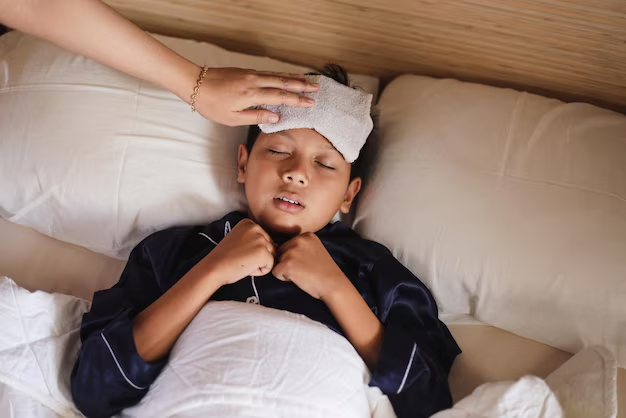Understanding Mycoplasma Pneumonia: What You Need to Know
Have you ever heard of Mycoplasma pneumonia and wondered what it is? If you're like most people, you've probably encountered the term in passing but might not be entirely clear about what it means or how it affects people. Mycoplasma pneumonia is a common respiratory infection that can be quite disruptive but is often misunderstood. Let's dive into what Mycoplasma pneumonia is, how it manifests, and what you might need to know if you or a loved one faces this condition.
What is Mycoplasma Pneumonia?
Mycoplasma pneumonia is a type of atypical pneumonia primarily caused by the bacterium Mycoplasma pneumoniae. Unlike other bacteria, Mycoplasma pneumoniae lacks a cell wall, making it unique and, in some cases, harder to treat with conventional antibiotics that target cell wall synthesis. This form of pneumonia is often referred to as "walking pneumonia" due to its typically less severe symptoms that don't necessarily confine a patient to bed.
Who is at Risk?
Age Groups
While anyone can contract Mycoplasma pneumonia, it frequently affects children, teenagers, and younger adults. This is primarily due to its higher rates of spread in group settings like schools, dormitories, and military barracks.
Environment
Living in crowded spaces or places with poor ventilation can increase the likelihood of spreading Mycoplasma pneumonia, as it is transmitted through respiratory droplets from coughing or sneezing. Those who spend lots of time in such environments are at a greater risk.
Other Risk Factors
Individuals with weakened immune systems or those with pre-existing respiratory conditions may experience more severe effects of Mycoplasma pneumonia. Additionally, smoking or regular exposure to pollutants can exacerbate the condition.
Symptoms of Mycoplasma Pneumonia
Understanding the symptoms is crucial for identifying Mycoplasma pneumonia. Common symptoms include:
- Persistent dry cough that doesn't produce much sputum
- Fever and chills
- Sore throat and hoarseness
- Headache
- Fatigue and general malaise
- Shortness of breath or difficulty breathing
While these symptoms often overlap with those of other respiratory infections, the distinctive prolonged dry cough can be a telltale sign.
Diagnosis and Testing
Initial Assessment
If Mycoplasma pneumonia is suspected, a healthcare provider will likely begin with a physical examination and review of symptoms. They might listen to lung sounds for any abnormalities indicative of pneumonia.
Diagnostic Tests
Confirmatory tests include:
- Chest X-ray: This can reveal lung inflammation typical of pneumonia.
- Blood tests: These can detect antibodies or the presence of the Mycoplasma pneumoniae bacteria itself.
- Sputum cultures: Though less common due to the dry nature of the cough, if sputum is produced, it can be cultured to identify the bacteria.
Treatment Options
While Mycoplasma pneumonia can often resolve on its own, medical intervention can help manage symptoms and speed recovery.
Antibiotics
Due to the absence of a cell wall in Mycoplasma pneumoniae, antibiotics like macrolides, such as azithromycin, or tetracyclines like doxycycline are often preferred. It's important to complete the full course of antibiotics to prevent resistance or recurrence.
Symptom Relief
Managing symptoms is a key part of treatment:
- Pain relievers like acetaminophen or ibuprofen can reduce fever and alleviate aches.
- Cough suppressants might be recommended for severe coughing.
- Staying hydrated and getting plenty of rest are crucial for recovery.
Lifestyle Adjustments
During recovery, avoiding smoking or exposure to smoke and pollutants can reduce irritation and aid healing.
Prevention Strategies
Preventive measures can significantly reduce the risk of contracting Mycoplasma pneumonia:
- Good hygiene: Frequent handwashing can prevent the spread of infection.
- Covering coughs and sneezes: Using a tissue or the elbow to cover the mouth helps minimize transmission.
- Vaccinations: While no vaccination specifically targets Mycoplasma pneumonia, staying up-to-date with general pneumonia vaccines can provide some overlapping benefits.
Complications
Though often mild, Mycoplasma pneumonia can lead to complications:
- Worsened respiratory symptoms in those with asthma or COPD
- Secondary bacterial infections, such as ear or sinus infections
- Exacerbation of existing chronic conditions
Recognizing and addressing these complications promptly with medical guidance is critical.
Mycoplasma Pneumonia vs. Other Pneumonia Types
Understanding how Mycoplasma pneumonia differs from other types of pneumonia can be beneficial. Unlike bacterial pneumonia caused by bacteria with cell walls, Mycoplasma pneumonia typically develops more slowly and with milder symptoms. It's also less likely to show the classic signs of bacterial pneumonia, like high fever and chest pain.
The Importance of Medical Consultation
While many cases of Mycoplasma pneumonia are mild and may be managed at home, seeking medical advice can be crucial, especially for diagnosing accurately and mitigating severe cases. A healthcare provider can provide personalized insights and recommendations based on individual health status.
Key Takeaways
Mycoplasma pneumonia is a common respiratory illness that, while often mild, shouldn't be disregarded due to its potential complications. Through awareness of symptoms, appropriate preventive practices, and understanding when to seek medical care, battling Mycoplasma pneumonia can be more manageable. Remember, maintaining good hygiene and a healthy lifestyle are your best defenses against this sneaky ailment.
Quick Summary: Mycoplasma Pneumonia Highlights 🦠
- Atypical pneumonia often called "walking pneumonia."
- Common in: Children, teens, and young adults; spreads easily in crowded settings.
- Main symptoms: Persistent dry cough, fever, sore throat, and fatigue.
- Diagnosis via: Physical exam, chest X-ray, blood tests.
- Treatment: Macrolide or tetracycline antibiotics, rest, hydration, symptom relief.
- Preventive tips:
- Wash hands frequently ✋
- Cover your mouth when coughing 🤧
- Avoid crowded places when possible 🏠
- Complications can include: Worsened asthma, secondary infections.
- See a healthcare provider for: Accurate diagnosis and avoiding complications.

Related Articles
- a Typical Pneumonia
- Can a Cold Turn Into Pneumonia
- Can a Sinus Infection Turn Into Pneumonia
- Can Amoxicillin Cure Pneumonia
- Can Amoxicillin Treat Pneumonia
- Can Baby Oil Cause Pneumonia
- Can Bronchitis Turn Into Pneumonia
- Can Covid Turn Into Pneumonia
- Can Doxycycline Treat Pneumonia
- Can Flu Turn Into Pneumonia
